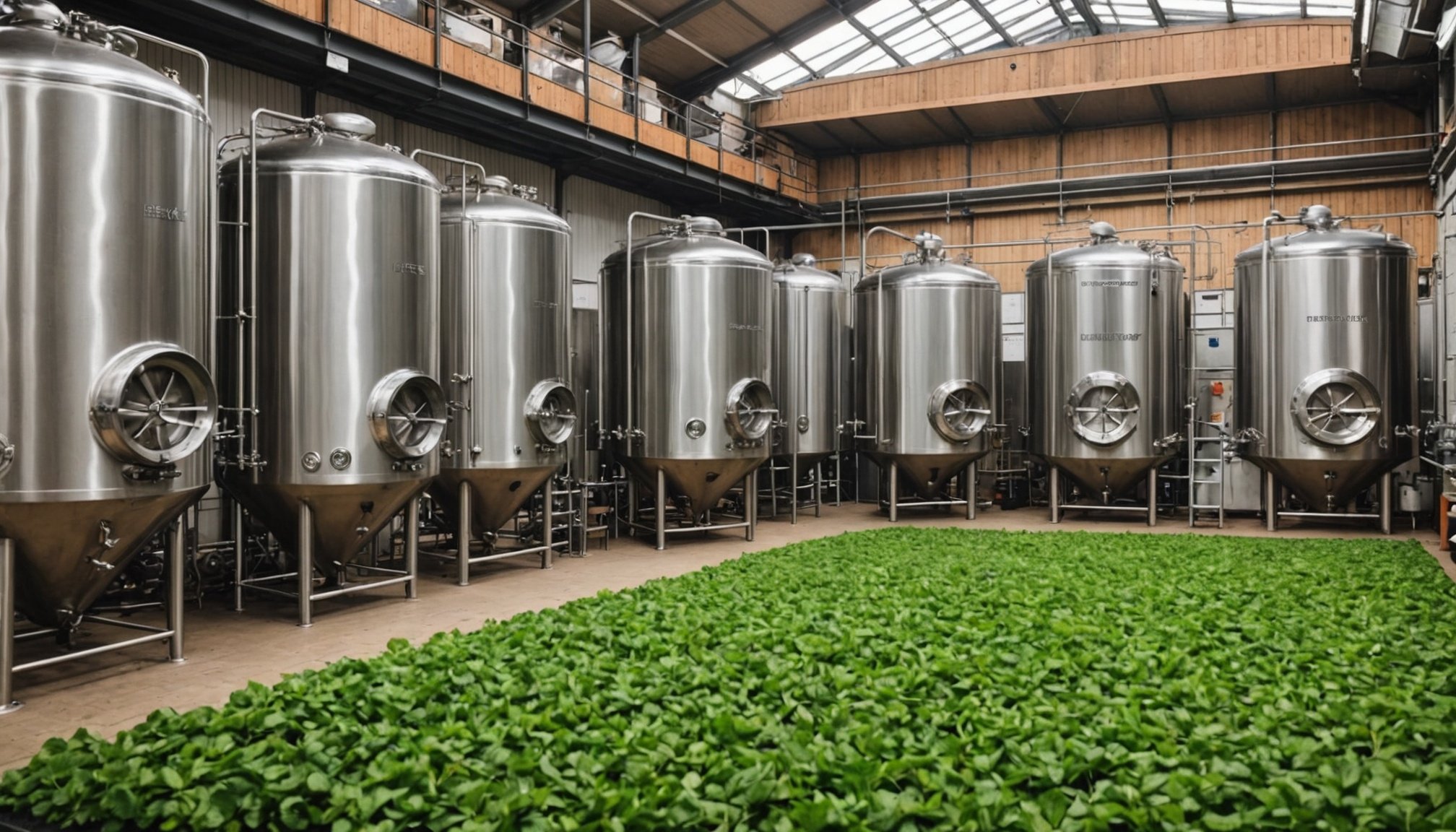The Importance of Sustainable Marketing in the Brewing Industry
As sustainability becomes increasingly paramount, the brewing industry is witnessing a paradigm shift. Many breweries are embracing eco-friendly branding, capitalizing on sustainable brewery marketing to appeal to environmentally conscious consumers. This trend is more than a passing fad; it’s a significant evolution in consumer values, reflecting a broader societal shift towards sustainable practices.
What are the benefits of green marketing strategies? They resonate profoundly with modern consumers, who are more discerning about the ecological impact of the products they purchase. This awareness compels brands to be transparent and innovative, adopting sustainable practices not only in production but also in marketing. By creating authentic narratives around sustainability, breweries can differentiate themselves in a competitive market.
Also to read : Revolutionizing UK Education: Top Gamification Techniques to Boost Student Engagement
Consider successful case studies that showcase effective sustainable brewery marketing. Breweries that implement impactful eco-friendly initiatives often experience enhanced brand loyalty and customer engagement. For instance, UK breweries have embraced innovative practices such as using biodegradable packaging and promoting recycling initiatives, which not only benefit the community but also enhance brand perception.
In today’s market, eco-friendly branding is not merely an option—it’s an essential component for success, fostering a strong connection with consumers who value sustainability.
Also read : AI-Powered Custom Nutrition Plans: Transforming Health Technology in the UK
Crafting a Unique Selling Proposition
Unique selling points are crucial for any brewery aiming to thrive in a competitive market. Leveraging sustainable practices can significantly enhance a brewery’s value proposition, offering distinct advantages over competitors.
To begin crafting these unique selling points, identify key sustainable practices that set the brewery apart. This can include anything from sourcing locally grown ingredients to utilizing renewable energy solutions in production. By focusing on these areas, breweries can highlight their commitment to sustainability while also emphasizing the positive environmental impacts resulting from these practices.
A brewery’s unique selling proposition should communicate not only the direct benefits to the consumer but also the broader environmental impact of choosing eco-conscious products. Consumers today are increasingly aware of how their choices affect the planet, making it vital for brands to convey both their dedication to and the tangible outcomes of sustainable efforts.
Additionally, integrating community involvement can enhance a product’s appeal. Supporting local causes or collaborating with nearby businesses fosters a deeper connection with consumers. By embedding community-oriented values in their marketing messages, breweries can appeal to a sense of social responsibility, further differentiating their products in the market.
Engaging Target Audiences
Understanding and connecting with the target audience is crucial for effective sustainable brewery marketing. To capture the attention of consumers interested in eco-friendly branding, begin by conducting a thorough demographic analysis. Identify and focus on consumers who prioritize sustainability, leveraging green marketing strategies to align with their values.
Utilising surveys and feedback mechanisms provides valuable insights into consumer behaviour. Gathering data helps breweries adapt their messaging to better resonate with their audience, making them feel heard and valued. This tailored approach not only boosts engagement but fosters brand loyalty.
Building a community through interactive events and social platforms is another powerful tool. Hosting sustainability-themed workshops or participating in local eco-events encourages consumer participation and strengthens the brand’s commitment to sustainable practices. Establishing an active presence on social media amplifies the brand’s sustainable messaging and helps engage with the demographic where they are most active.
Engaging your audience in meaningful ways further differentiates the brewery in a competitive market. By focusing on demographic analysis, using consumer feedback, and creating community-driven initiatives, breweries can build enduring relationships with consumers who care about sustainability.
Strategies for Digital Marketing Alignment with Sustainability Goals
In the realm of digital marketing, aligning strategies with sustainability goals is essential for modern breweries. The key lies in crafting compelling eco-friendly content marketing. This approach involves creating narratives that highlight the brewery’s sustainable efforts, resonating with environmentally conscious consumers. By promoting these values across digital platforms, brands can consistently engage their audience.
Social media sustainability plays a pivotal role in amplifying a brewery’s eco-friendly message. Interactive content, like videos or infographics, showcasing sustainable practices helps capture attention. Utilizing platforms such as Instagram or Twitter allows for real-time engagement and community building, further embedding the brand’s commitment to sustainable values.
Implementing effective SEO tactics is also crucial. Keywords related to sustainable brewery marketing ensure the brand surfaces in sustainability-focused searches. This strategic move not only drives traffic but also positions the brewery as an authority in environmentally friendly brewing practices. Marketing teams should focus on optimizing website content for these keywords to improve their search rankings.
Digital marketing, when aligned with sustainability, becomes a powerful tool for building lasting connections with the target audience, ensuring the brewery stands out in the competitive market.
Measuring Impact and Success
For sustainable brewery marketing efforts to truly succeed, it is essential to measure impact through clear marketing metrics and sustainability benchmarks. Key performance indicators (KPIs) such as sales growth, brand awareness, and customer loyalty are crucial for assessing the effectiveness of green marketing strategies. Tracking these KPIs enables breweries to refine their approach and ensure alignment with eco-friendly branding goals.
By leveraging tools for performance analysis, breweries can gather insights into consumer engagement. Advanced analytics platforms, like Google Analytics, can track digital interactions, while surveys provide qualitative feedback on customer satisfaction and environmental perceptions. Implementing these tools ensures comprehensive understanding of how sustainable initiatives resonate with target audiences.
Evaluating the environmental impact of marketing strategies is equally vital. This involves assessing elements such as carbon footprint reduction, energy consumption, and waste management improvements through sustainable marketing campaigns. Establishing clear benchmarks helps breweries showcase their dedication to environmentally responsible practices.
Ultimately, by employing these methodologies, breweries can enhance their strategies, appealing to environmentally conscious consumers while bolstering their sustainable brewery marketing footprint. These insights foster continued innovation and adaptation, securing their position in a competitive market focused on eco-friendly practices.
Examples of Successful Campaigns
In the brewing industry, sustainable marketing campaigns have set notable precedents. UK breweries are particularly distinguished for pioneering eco-friendly branding. One exemplary case is BrewDog, which has gained attention for its comprehensive approach. BrewDog not only offsets its carbon emissions but also plants trees for carbon containment, reinforcing its commitment to sustainability. Another instance is Adnams, which has integrated renewable energy into its brewing processes, demonstrating a value proposition deeply tied to environmental consciousness.
These campaigns underscore the power of storytelling in promoting sustainable values. BrewDog’s narrative, tied to environmental activism, engages customers by connecting their purchases to global ecological improvement. Similarly, Adnams educates consumers on reduced carbon footprints through energy-saving techniques, fostering enduring consumer loyalty.
Key lessons from these campaigns highlight the strategic blend of green marketing strategies with relatable, yet impactful storytelling. By incorporating authentic and transparent narratives, these breweries have successfully appealed to modern consumers’ growing demand for environmentally responsible practices. This approach, grounded in meaningful actions, not only elevates brand reputation but also sets industry best practices, serving as a beacon for other breweries aiming to adopt and succeed in sustainable marketing.









